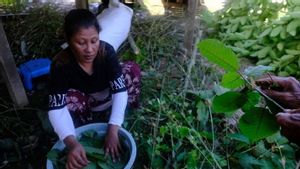JAKARTA The legacy often makes family relations tenuous, as happened in Karawang and Palembang recently. From the perpactive sociology, this happens, one of which is because of the condition of society which is increasingly turning into fire, while in terms of law, it is caused by the origin of assets mixed during marriage.
A grandmother named Kannut, 77, came to the South Sumatra Police (Sumsel) using a wheelchair after being reported by her four children for inheritance disputes. Kannut was sued and reported by four of his biological daughters for alleged document falsification cases.
"Hj Kannut was reported by his children for embezzlement of inheritance rights. In his report this mother sold land without her child's approval. But we have evidence that it has been approved by her children," said Moh. Novel Suwa, Director of LBH Bima Sakti.
A similar case of Kusu Lutaki, a Karawang resident, has been sued by his own biological child, Stephanie Sugianto. This case began when the reporter, Stephanie, reported that Kusu had buried him to the West Java Police for falsifying the signature of the Waris Certificate (SKW).
The relationship between the mother and child has occurred since Kusu Lutaki's husband, Sugianto, died in 2013. Sugianto has a family business which is now managed by Kusu Lutaki.
Stephanie admitted that she reported her mother, for defending her rights as one of the heirs of her late father, Sugianto, in order to get fair treatment and get a share of inheritance rights as stipulated in the provisions of inheritance law.
Wirjono Prodjodikoro in the Heritage Law in Indonesia said that the legacy is about whether and what the rights and obligations about a person's wealth when he dies will turn to other people who are still alive.
Citing the Law on Online in Indonesia, there are three types of inheritance law used in the distribution of inheritance, namely Islamic inheritance law, customary inheritance law, and civil law or civil code.
According to Farizal Pranata Bahri, a criminal law observer from JFB Indonesia Legal Consultant, said that the division of inheritance regulations in Indonesia is based on the religion held by legal subjects.
"If the legal subjects are Muslim, then they use Islamic law. Those who have the right to receive inheritance are their biological children, husband or wife, one of whom died, and the relationship between siblings is arbitrary, either from the lineage of the mother or father with the first line," Farizal told VOI.
"If in Islam the distribution is clear because it is regulated in the Qur'an and hadith, while non-Muslims are regulated based on the Civil Code," he continued.
The basis and main source of heritage law in Islam is contained in letter An-Nisa verse 11. In Islamic law, the distribution of heirs is divided according to blood relations and marriage relations. Blood relations are divided into two groups, namely men (fathers, boys, brothers, uncles, and grandfathers) and women (mothers, daughters, sisters, and grandmothers). Meanwhile, heirs in the marriage relationship are divided into two, namely widows or widowers.
In contrast to the laws of heritage in Islam, civil inheritance law does not distinguish the amount of inheritance for men or women. In civil inheritance law, the rights of men and women in terms of inheritance are considered equal. inheritance rights are prioritized for families, whether inbreeding or because of marriage.
Regarding the phenomenon of child lawsuits against parents due to inheritance problems, according to several sources, it is due to the greed of the heirs, misunderstanding, and the dominance of the oldest heirs who want to get more part of the division of assets.
Farizal said that the division of inheritance is often a problem in the family because of the origin of assets that have mixed during marriage.
SEE ALSO:
"This became a polemic when one of them died, either husband or wife, so that the heirs were fighting over the origin of the property by arguing that it was their extended family heritage that had not been shared before," he explained.
For this reason, Farizal said, so that unwanted things do not happen, it is better if the division of this legacy is announced in a notary to avoid conflict.
"In the notarill deed, it will be clear that the distribution is in accordance with the will of the heir," said Farizal.
State University Sociologist Sebelas Maret (UNS) Rahesli Humsono said the phenomenon of children suing parents showed the weakening of family values in society.
The child's lawsuit against parents was caused by a number of factors. Rahesli explained, this happened because of differences in the meaning of the function of the family as protection for all children.
"From the parents' side, they feel that they are protecting their children by providing the proceeds of selling land for their children's needs," said Rahesli, quoted by Kompas.
"But in terms of children, it may be different, which is what gets less from his brother so that he feels he doesn't get the same protection," he continued.
In addition, Rahesli also said that nowadays many think that parents are no longer the only source of success for children.
Science, network, and work that children are all very likely to find themselves make them argue that families are no longer a source of success.
Another cause is the condition of society which is getting worse, making everything gorigid or rigidly counted. Children think what is given to them must be the same as other siblings, thus encouraging the phenomenon of children suing their parents.
Rahesli hopes that the inheritance lawsuit cases can be resolved amicably without taking legal action.
"Cases like these need to be encouraged to be resolved amicably, to strengthen family values," he concluded.
The English, Chinese, Japanese, Arabic, and French versions are automatically generated by the AI. So there may still be inaccuracies in translating, please always see Indonesian as our main language. (system supported by DigitalSiber.id)














